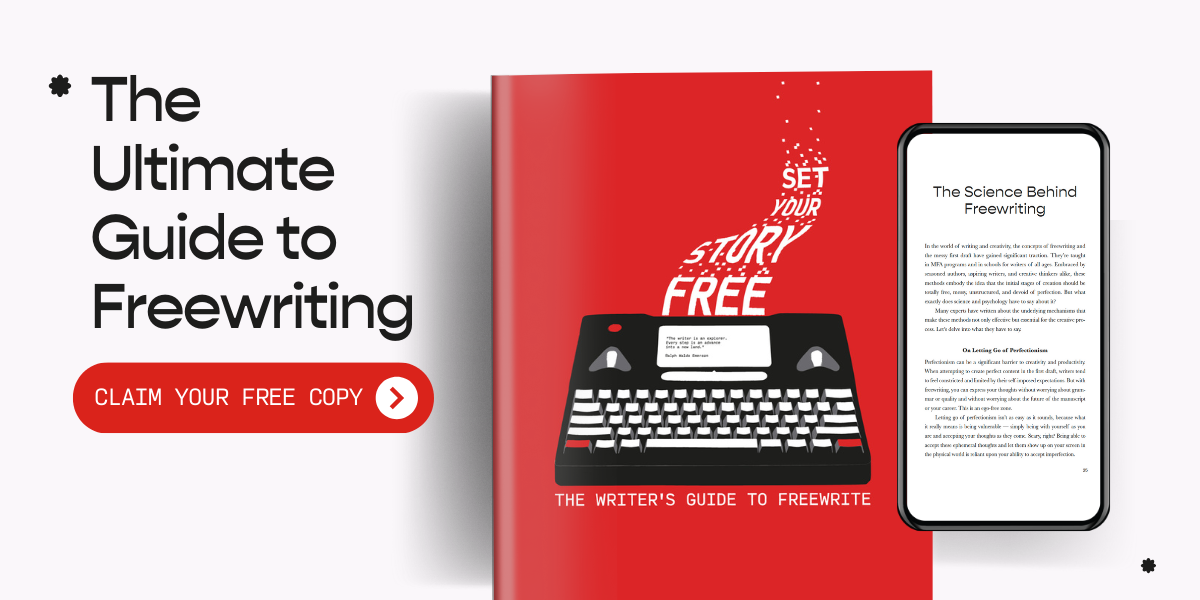Drafting forward without editing as you go is the core ethos of Freewrite. Remember that the goal of drafting forward is to get a first draft recorded and translate your thoughts into writing on the page. Revising is a separate step in the writing process and should be reserved for later stages.
But that’s easier said than done, isn’t it? If you haven’t tried drafting forward before — or maybe you have but you’re getting rusty — it’s important to follow several rules to avoid the editing-as-you-go that comes so naturally to writers, as well as other distractions.
To guide your practice, we’ve compiled Freewrite’s 14 Rules for Drafting Forward. Try these during your next writing session and see how they streamline your drafting process and increase your productivity during the drafting stage.

1. Do research after drafting. (Or before!)
Certainly, research is important across various writing industries and genres. However, it has the potential to become one of the worst forms of procrastination. It's extra tricky because it convinces you that you're actually being productive. So how do you prevent this?
Complete the majority of your research prior to drafting. Alternatively, for subjects within your realm of expertise, consider deferring research until the revising phase. When drafting, if you reach a point requiring a fact-checking or additional information, leave a prompt for yourself right there within the text and proceed with the drafting process.
2. Set a specific goal.
Begin with a clear understanding of what you want to accomplish in this first draft. You should also have a goal each time you sit down to write. This goal can be as tangible as an outline or notes written on Post-Its, or it can be simply to “write for 25 minutes.” (If you enjoy timed sprints, check out the Pomodoro method!)
3. Deal with external distractions.
We’ve done the hard work for you by creating Freewrite. Now, turn off the TV and put your phone in a different room. Block out your writing time on a calendar so that loved ones know when you aren't to be disturbed.
4. Silence your inner critic.
Avoid the urge to critique or edit your work as you go. Instead, concentrate on getting your thoughts down without judgment.
5. Decide you’re going to write a messy first draft.
It’s not enough to say you’re not going to critique your work, we recommend stating it outright: “My goal is to write a messy first draft.” Write it down, stick it on your wall, and embrace the imperfection. This is critical to being able to write freely.
6. Turn off your inner spellcheck.
Freewrite has no spellcheck or grammar check. And that's on purpose. Every squiggly line is a distraction, a moment that your writing flow is broken and you have to resist going back to fix typos. Even if your eyes recognize typos, train your brain to fix it later!
Note: This is difficult, especially for writers, and it could take you time to master this method. We highly recommend doing the work to train your brain not to stumble across typos. This will help you stay in flow longer. And besides, with all the editing software out there these days, cleaning up a messy first draft is easier than ever!
7. Avoid overthinking.
Trust your instincts and write without overanalyzing each sentence. Did that last sentence sound stupid?Who cares?! Anything goes in a messy first draft. You’ll refine and revise later!
8. Write fast.
This serves as an additional technique to coax your mind into tapping into that profound, creative reservoir inaccessible during periods of overthinking. Aim for a state of flow where your typing pace matches the natural rhythm of your thoughts.
9. Foster forward momentum.
Should you experience writer's block or find yourself grappling with a challenging section, avoid the urge to stop and ruminate on it. Instead, move on to a different part and revisit the troublesome section later.
We personally find it beneficial to insert a note directly into the draft, serving as a reminder to revisit that particular spot during the editing phase.
10. Use placeholders.
If you're struggling to find the perfect word or need to verify a source, simply insert a placeholder and continue writing. A preferred placeholder for us is "xx," as it can be easily searched using editing software. Alternatively, some prefer placeholders like "[INSERT QUOTE]" or "[CHECK SOURCE]." These gaps can be filled in during the editing phase.
11. No back-tracking.
While Freewrite devices do have backspace keys, we’d like to challenge you to use it as little as possible. Or not at all. Remember: Anything can be fixed later. But your writing flow is fragile.
12. Accept redundancy.
Frequently during the drafting process, a brilliant sentence may come to us, even if it describes something already mentioned. If this happens to you, refrain from backtracking, deleting the initial sentence, and substituting it with the new one. Instead, continue writing the new sentence! Addressing these redundancies is a straightforward task that can be tackled during the editing phase.
13. Experiment.
Try different styles and approaches without judgement. You can evaluate and pick the best one later, during the editing stage.
14. Relish the creative flow and focus on the joy of creating.
If you try the above rules of forward drafting, we suspect you’ll unlock a way of writing that you may not have experienced since you were a kid. You’ll be surprised by how much you write, the creative ideas your imagination comes up with, and how much fun you have while writing.
Looking to learn more? Download Set Your Story Free: The Writer's Guide to Freewrite absolutely free.





















